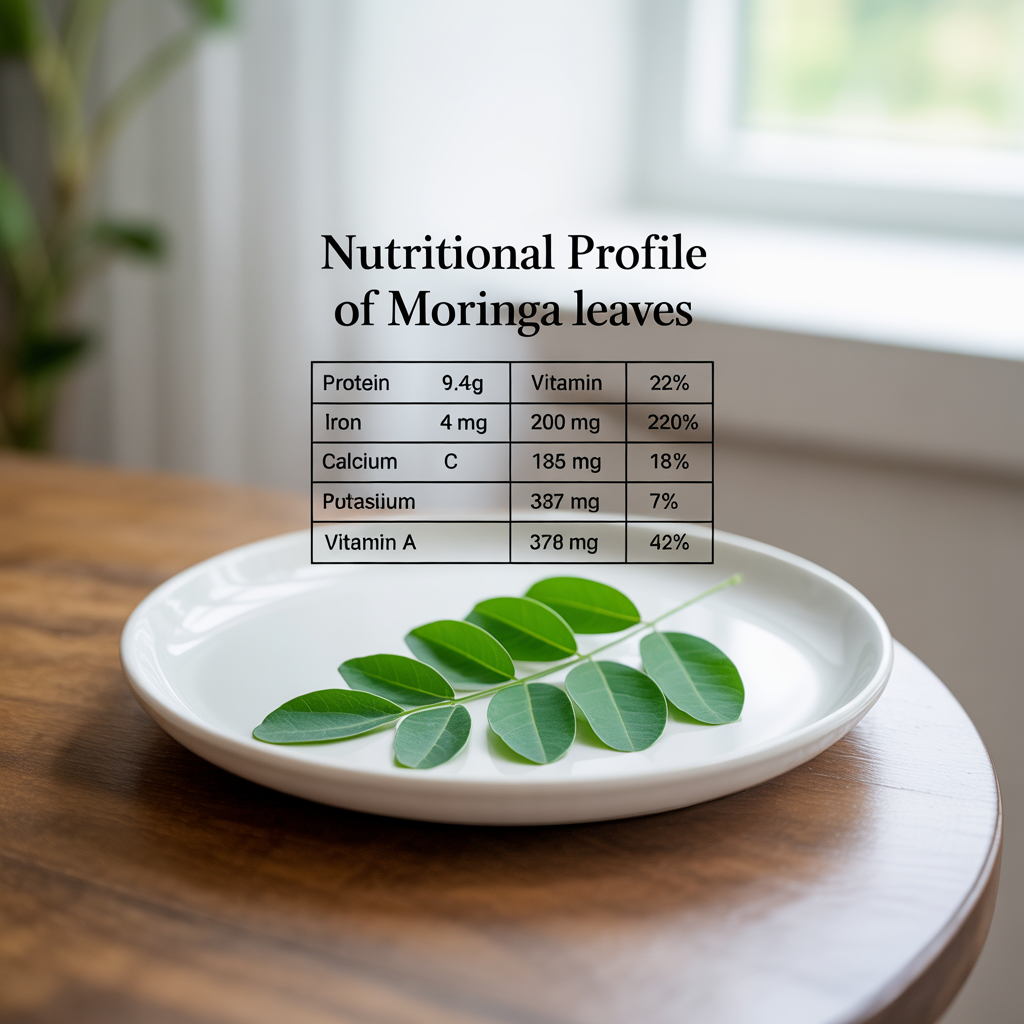Moringa oleifera, commonly known as the “miracle tree”, has been valued in India for centuries for its medicinal and nutritional properties. Modern scientific studies increasingly confirm the health benefits of moringa, making it a popular natural supplement worldwide. Rich in vitamins, minerals, and antioxidants, moringa supports various aspects of human health, from blood sugar regulation to immune boosting.
This article outlines nine verified health benefits of moringa based on research from reputable sources such as the National Institute of Nutrition (NIN), the Journal of Food Science and Technology, and the National Center for Biotechnology Information (NCBI).
Nutritional Profile of Moringa Leaves

The health benefits of moringa are largely attributed to its nutrient-dense leaves. Per 100 grams of dried moringa leaves, the composition includes:
| Nutrient | Quantity | % Recommended Daily Allowance (RDA) approx. |
|---|---|---|
| Protein | 9.4g | 15-20% |
| Iron | 4 mg | 22% |
| Vitamin C | 200 mg | 220% |
| Calcium | 185 mg | 18% |
| Potassium | 337 mg | 7% |
| Vitamin A | 378 mcg | 42% |
These high levels of protein, vitamin C, vitamin A, iron, and calcium contribute to moringa’s overall health-promoting effects.
1. Blood Sugar Control
One of the most important health benefits of moringa is its ability to regulate blood sugar levels. Studies published in the Journal of Food Science and Technology have demonstrated that moringa leaf extracts reduce blood glucose in diabetic patients by improving insulin sensitivity. The bioactive compound chlorogenic acid slows down carbohydrate absorption, preventing sudden spikes in blood sugar.
A 2015 study from the NCBI found that patients consuming moringa leaf powder daily saw a significant drop in fasting blood glucose over a three-month period. This makes moringa a natural adjunct for diabetes management, especially in India where diabetes prevalence is rising rapidly.
2. Anti-Inflammatory Properties
Chronic inflammation is linked to many diseases, including arthritis and heart conditions. Moringa’s leaves contain antioxidants such as quercetin and isothiocyanates that combat inflammation effectively.
Research published in Phytotherapy Research states that these compounds inhibit inflammatory enzymes and reduce oxidative stress markers in the body. Regular consumption of moringa can therefore help mitigate symptoms of inflammatory disorders.
3. Cardiovascular Health
Moringa supports heart health by lowering LDL cholesterol and reducing high blood pressure. According to a study in the International Journal of Molecular Sciences, moringa leaf powder reduced serum cholesterol levels in animal models, which correlates with a lower risk of heart disease.
Moreover, potassium in moringa aids in balancing sodium levels and relaxing blood vessels, further contributing to improved blood pressure control.
4. Potential Anti-Cancer Effects
Emerging studies suggest moringa possesses anti-cancer properties. Laboratory experiments show compounds like niazimicin can inhibit the growth of cancer cells, including those in breast and liver cancers.
While these results are promising, clinical trials in humans are still ongoing. The National Cancer Institute advises that moringa should not replace conventional cancer treatments but may be considered a supplementary option under medical guidance.
5. Skin and Liver Health
Moringa is rich in vitamins A and C, essential for skin repair and collagen production. These vitamins also protect the liver from damage caused by oxidative stress and toxins.
A study in the Journal of Applied Pharmaceutical Science found moringa leaf extract to improve liver function markers, indicating its detoxifying and regenerative potential.
6. Digestive Health
The dietary fiber content in moringa promotes healthy digestion by preventing constipation and supporting gut microbiota. According to research by the Indian Journal of Medical Research, moringa stimulates digestive enzymes and has mild laxative effects.
Regular consumption can help maintain digestive regularity and reduce discomfort caused by indigestion.
7. Immune System Support
Moringa leaves boost immunity by enhancing the production of white blood cells. They also possess antimicrobial properties effective against bacteria such as E. coli and Salmonella.
A 2017 study in Evidence-Based Complementary and Alternative Medicine concluded that moringa supplementation increased resistance to infections in immunocompromised subjects.
8. Cognitive Benefits
Antioxidants in moringa help protect brain neurons from oxidative damage, improving memory and mood regulation. According to a review published in the Neurochemical Research journal, moringa supports neurotransmitter function and may help manage neurodegenerative diseases like Alzheimer’s.
9. Weight Management
Moringa can aid in weight management by boosting metabolism and suppressing appetite. A study from the Journal of Diabetes and Metabolic Disorders found that moringa supplementation led to significant reductions in body fat and improved lipid profiles in obese patients.
How to Use Moringa Safely
Moderation is key when consuming moringa. While the leaves and powder are safe, excessive intake of bark and roots can be toxic.
Moringa powder can be easily added to teas, smoothies, dals, or curries. In India, moringa is commonly cooked as a vegetable or dried and ground for use as a nutritional supplement.
Summary Table of Health Benefits of Moringa

| Health Benefit | Supporting Evidence |
|---|---|
| Blood Sugar Control | Improved insulin sensitivity and reduced glucose |
| Anti-Inflammatory | Quercetin and isothiocyanates reduce inflammation |
| Cardiovascular Health | Lowers LDL cholesterol and blood pressure |
| Anti-Cancer Potential | Niazimicin inhibits cancer cell growth (preclinical) |
| Skin & Liver Health | Vitamins A & C promote repair and detoxification |
| Digestive Health | Fiber improves digestion and gut function |
| Immune Support | Enhances white blood cells and antimicrobial action |
| Cognitive Benefits | Protects neurons, supports memory and mood |
| Weight Management | Boosts metabolism, suppresses appetite |
India’s age-old reliance on moringa is now being validated by modern science, confirming its role as a powerful natural supplement that supports various health aspects (see detailed insights on WebMD). Incorporating moringa into daily diets could provide a significant boost to overall wellness, especially in a country facing rising chronic diseases.




